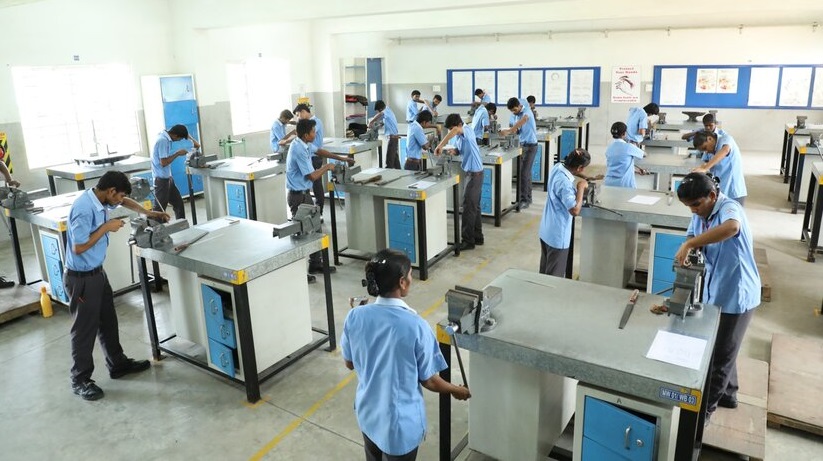
With a vision to provide systematic technical and non-technical training to matriculated youth from rural India and to help them inculcate both life and job skills, Amara Raja Skill Development Centre (ARSDC) was set up in 2014, under the aegis of Rajanna Trust, which is fully supported by Amara Raja Group.
We caught up with Mr. Ravikumar Kommana, Dean at Amara Raja Skill Development Center, to understand how ARSDC is equipping the rural youth with relevant skills to make students industry-ready with innovative methods. We are glad to share our conversation below.
Q: How is ARSDC bridging the gap between industry and academia through skill development and vocational training?
A: We all are aware that there is a visible mismatch between the requirements of the Industry and the availability of the talent pool. We, at Amara Raja, believe that we can play a critical role in this and thus Amara Raja Skill Development Centre (ARSDC) was established with the mission of skilling rural India. Through our focused efforts, we ensure that we minimize the talent gap in society by providing training in skills, in accordance with the ever-changing business environment.
The basics of many technical subjects are taught to the students, including IT, Communication, Maths and Sciences, and so on. ARSDC also conducts mechanical workshops in electronics and electrical labs intending to transform all the theoretical knowledge into practical knowledge. ARSDC is established to expose the student to practical awareness so that they attain a thorough understanding of various applications. We follow 30% theory and 70% practical approach.
For example, the mechanical fitting shop is equipped with all the requirements of the manual metalworking operations like filing, hacksawing, hammering, chipping, number and letter punching, tapping, die passing, reaming, polishing, etc.
Different kinds of charts (NIMI charts) are displayed in the shop on the pinboard which is suitable for the student to refer to all kinds of tools and measuring instruments. The drawing hall is designed well for students to draw and practice.
The computer lab is well equipped with high configuration computers. AutoCAD is also taught. The students have the facility to refer to technical and non-technical books in the library. Classrooms are also equipped with digital learning capabilities.

Q: What are the ways and strategies through which you are able to impart both life skills and job skills among the students?
A: Life skills are imparted through participation in different activities apart from teaching subjects like moral values, ethics, communication skills, team building, cultural activities, sports activities, yoga practice, and so on. The entire pedagogy that we have at ARSDC is structured in a manner that life skills become an integral part of their life at ARSDC.
By imparting basic life skills, the students are empowered to deal well and effectively with the challenges of life. Communication helps in developing interpersonal skills. They are good at decision making and problem-solving through QCC concepts, creative and critical thinking, self-awareness and empathy, assertiveness, self-control, resilience-ability to cope with problems.
Jobs skills are developed by giving some project works, activity-based learning (ABL), and project-based learning (PBL). Students at the Centre are also assigned to projects and to work together as teams to find solutions. They do it with proper teamwork, problem-solving, planning, organizing, and learning technology.
Q: Could you brief us about the Multi-skill Technician course and what makes it stand out?
A: Multi-skill Technician course focuses on different technical skills coupled with life skills. This is a multidisciplinary broader spectrum of skilling wherein various technical and life skills are imparted. At the end of the programme, we endeavor to shape up students similar to a T-shaped person who will have deep knowledge/skills in one area and a broad base of general supporting knowledge/skills. This allows us to provide a more comprehensive rounded citizen to the society who has higher capabilities and therefore enhanced employability.
The training program for the first three months is at ARSDC followed by On-the-job training (OJT) in different businesses of Amara Raja Group. The stipend is paid from the first month onwards for them to “learn and earn” and thereby they are also able to support their families back in their villages and bring more joy to their lives. The training is fully free for all the students. While they are at ARSDC for the first three months, they are also provided free food and accommodation.
Once they move on to the OJT, they have to pay for their food and accommodation and to that extent, the stipend also increases. We also provide them uniforms, shoes, socks as well as all necessary personal protection equipment, and no charges are levied for any of these. Extracurricular activities including various games, sports, cultural programs, yoga, calisthenics, etc. are conducted and students are trained in these aspects.
Q: How important are apprenticeships in skill development and training and how is ARSDC implementing them?
A: Apprenticeships are indeed critical for skill development and in a way, we at ARSDC are doing much beyond a typical apprenticeship programme to help students gain a higher level of technical and life skills. ARSDC plays an important role in transforming them by making them follow a disciplined schedule, with the aim to mold them into the right form through experienced and qualified faculty apart from OJT assessments, continuous interaction with trainees, and Shop Floor Supervisors. ARSDC faculties conduct frequent shop-floor visits, provide feedback to trainees, and arrange meetings with HR and Line Supervisors.
Q: How do you ensure that students are industry-ready?
A: Students are skilled in all the aspects through the training programs they undergo. Their capacity and capability to understand and act improve with exposure, guidance, and practice to the level that we can see them becoming Industry ready. They also undergo special training in the Industry in the second phase for 9 months and in the third phase for 12 months to learn skills live from the Industry in order to increase their capability of working on a machine and to enhance their skills in analyzing every process and more importantly develop them as responsible citizens. There is an evaluation system devised by involving Shop Floor Supervisors and Managers who also conduct viva voce and assess the knowledge and skills acquisition of the trainee.
Q: What are some of the challenges and opportunities in skilling rural India?
A: It’s really challenging to undertake skilling in rural India and transform the lives of students. First, we have to attract these youngsters, make them appreciate and convince the larger impact of joining such a programme, show them the larger picture of how they can impact themselves and the society at large.
We have to groom them from scratch, inculcating confidence in them, nurturing their talents, imparting skill sets through training and education so that they can impact the world of tomorrow. We have to be careful to ensure that they transform every angle without any kind of negative feeling in them. Bringing out this kind of outcome is a humongous and equally rewarding task.
The majority of the students may not initially have the inclination in education/skilling, employment and may not have thought about their future. Many of them could be introverts and also engaged for the first time in organized employment for their family, etc.
Q: Do you also impart entrepreneurial skills among your students? If yes, please tell us how?
A: Yes, entrepreneurship is one of our five core values. It is an integral aspect of the Amara Raja way. We consciously impart entrepreneurial skills amongst our students so that they will be entrepreneurs in their own right while working on the shopfloor or may want to go outside and start something entrepreneurial on their own. We take steps to make them understand and practice. Entrepreneurship in a manner that they should be proactively rebelling for better ways of doing things leading to newer possibilities.
They are inspired to challenge the status quo, question and come up with new ideas, quality circles, Kaizen improvements. They are well trained in critical thinking, strategic thinking, analytical thinking, and a host of other entrepreneurial skills. While on OJT, students will get an opportunity to learn skills like 5s, TPM, TQM aspects, etc. which becomes an added advantage to the students.
During the OJT, the ARSDC faculty along with the Supervisors and Managers at the shop floor will be assessing the student’s discipline, attitude, learning ability, and performance at respective workplaces and their initiatives at work. Every month, executives from the organization will be sending the assessment forms about the performance of students. Thus, students are coached by the ARSDC faculty and further trained to become better individuals. During OJT, students can opt for any two specialization subjects. Viva-voce will be conducted at the end of OJT and then final certificates will be issued at the ceremonial function of Convocation. The toppers are awarded trophies and merit certificates.
Advanced training in Hydraulics and pneumatics are also provided to the students. After the successful completion of their training at ARSDC, based on the business needs, the students are placed in different companies of Amara Raja Group.













